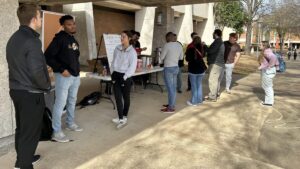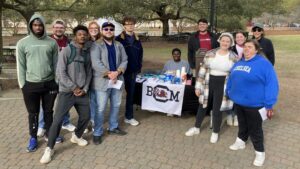“I just didn’t understand it. They had nothing to gain by loving us. But they loved us” (Hayes 78).
I recently read the book Glad You’re Here: Two Unlikely Friends Breaking Bread and Fences, by Walker Hayes and Craig Allen Cooper. While it is a beautiful story of their friendship over the past few years, I quickly realized it was more than that. This book is an unlikely instructional guide to personal evangelism.
No offense to anyone, especially Walker Hayes, but I’m not a big fan of country music. I can’t name very many country artists, much less their songs. However, like almost everyone else in America, I have seen more than one TikTok video with the soundtrack of his song “Fancy Like.” After coming across a podcast interview with both Hayes and Cooper, I wanted to know more about their story.
As the story of their friendship and God’s redemption unfolded in the book, I was reminded of a few things:
1. Loving others can be difficult and messy, but it is so worth it.
In Matthew 22:37-40, we are commanded to love God and love others. As God meets us where we are, so must we meet others where they are. Truly caring for someone can at times be difficult; it can be inconvenient. But we are called to love them through their struggles, their doubts and their choices.
When Walker showed up to church drunk, Craig said, “Glad you’re here.”
When Walker said he didn’t believe in God, Craig treated him as a friend, not a project.
When Walker’s family couldn’t afford a vehicle to hold his growing family, Craig gave him his van.
2. God delights in answering our very specific prayers because it brings Him glory.
John 14:13 says, “Whatever you ask in My name, which will I do, so that the Father may be glorified in the Son.”
When we are faithful to pray and align our prayers with God’s desires for us, He answers us.
Craig desperately prayed for encouragement and wondered if he was being effective in ministry. God answered that very day by way of a song Walker wrote about him giving away his van.
Craig’s daughter prayed for a family dog that met very specific family criteria. Walker’s wife unknowingly offered to give her one of their dogs that needed to be rehomed. That dog (who happened to meet each of the requirements) provided opportunities for their families to spend additional time together.
Craig and his wife prayed that Walker would stop drinking. Walker, who began drinking as a young teenager and had an unhealthy relationship with alcohol, told them it would be the only way he would believe there was a God. The following day Walker was sick and chose not to have a drink. He made the same decision the next day. And the day after that.
God answered each of those prayers and used those circumstances to draw Walker to Himself, revealing to him that he was loved not only by Craig and his family but by the Creator of the universe.
3. True biblical community can only happen when we are vulnerable with one another.
Zephaniah 3:17a (ESV) says, “The Lord your God is in your midst, a mighty one who will save.”
It can be hard to be vulnerable, even with our closest friends. We often want others to only see the best parts of ourselves. As Christians, we don’t have everything figured out. We continue to sin, struggle and sometimes doubt when things are hard. However, when we as Christians live authentically in front of others, we speak and live out the Gospel in a way that God uses to knit us to each other and Himself. He is in the midst of these relationships and can use difficult circumstances to save.
Walker and Craig removed the fence that separated their backyards to create one big yard when they lived next door to another.
They spoke the hard conversations.
They showed hard emotions.
They walked through the hard circumstances together.
And day by day, God softened Walker’s heart to the Gospel, leading Walker to give his life to Christ.
What does this mean for us?
This fall, approximately 200,000 students who do not have a personal relationship with Christ will walk across our Alabama campuses daily.
How will we receive them in our campus ministries, churches, and local communities?
Will we be frustrated by and judgmental of their lifestyles, decisions, and opinions? (By even their mere presence? Let’s face it, traffic can be a nightmare when students return to our college towns.)
Will we distance ourselves from their mess?
Or will we see them as God sees them and strive to know them, listen to them, share Truth with them and love them through it all?
“Love is patient and kind; love does not envy or boast; it is not arrogant or rude. It does not insist on its own way; it is not irritable or resentful; it does not rejoice at wrongdoing, but rejoices with the truth. Love bears all things, believes all things, hopes all things, endures all things” 1 Corinthians 13:4-7 (ESV).
I pray that we will meet them where they are and love them well in the name of Jesus. All for the glory of God.
State Missionary Kim Andrews serves as campus minister at the University of Alabama and Shelton State Community College.



